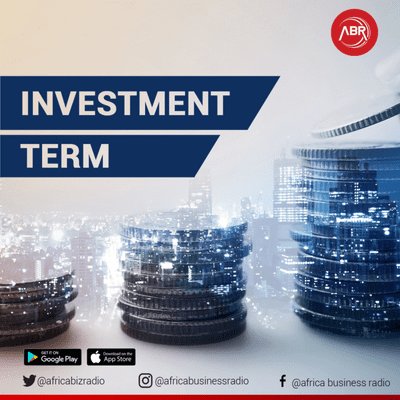
Investment Terms
engelsk
Business
Prøv gratis i 14 dager
99 kr / Måned etter prøveperioden.Avslutt når som helst.
- 20 timer lydbøker i måneden
- Eksklusive podkaster
- Gratis podkaster
Les mer Investment Terms
An audio glossary of investment terms for young people and intending investors.
Alle episoder
30 EpisoderInvestment Term Of The Day : Exchange Traded Notes
Exchange-traded notes or ETNs are types of unsecured debt securities that track an underlying index of securities and trade on a major exchange like a stock. ETNs are similar to bonds but do not have interest payments. Instead, the prices of ETNs fluctuate like stocks An ETN is typically issued by financial institutions and bases its return on a market index. ETNs are a type of bond. At maturity, the ETN will pay the return of the index it tracks. However, ETNs do not pay any interest payments like a bond. When the ETN matures, the financial institution takes out fees, then gives the investor cash based on the performance of the underlying index. Since ETNs trade on major exchanges like stocks, investors can buy and sell ETNs and make money from the difference between the purchase and sale prices, minus any fees. ETNs do not provide investors ownership of the securities but are merely paid the return that the index produces. As a result, ETNs are similar to debt securities. The investors must trust that the issuer will make good on the return based on the underlying index. ETNs were first issued by Barclays Bank PLC. Banks and other financial institutions typically issue ETNs at $50 per share. Part of the market price depends on how the underlying index is performing. --- This episode is sponsored by · Anchor: The easiest way to make a podcast. https://anchor.fm/app [https://anchor.fm/app]
Investment Term Of The Day : Tax Planning
Tax planning is the analysis of a financial situation or plan from a tax perspective. The purpose of tax planning is to ensure tax efficiency. Through tax planning, all elements of the financial plan work together in the most tax-efficient manner possible. Tax planning is an essential part of an individual investor's financial plan. Reduction of tax liability and maximizing the ability to contribute to retirement plans are crucial for success. Tax planning covers several considerations. Considerations include timing of income, size, and timing of purchases, and planning for other expenditures. Also, the selection of investments and types of retirement plans must complement the tax filing status and deductions to create the best possible outcome. --- This episode is sponsored by · Anchor: The easiest way to make a podcast. https://anchor.fm/app [https://anchor.fm/app]
Investment Term Of The Day : Stock Option
A stock option gives an investor the right, but not the obligation, to buy or sell a stock at an agreed upon price and date. There are two types of options: puts, which is a bet that a stock will fall, or calls, which is a bet that a stock will rise. There are two different styles of options: American and European. American options can be exercised at any time between the purchase and expiration date. European options, which are less common, can only be exercised on the expiration date. Options do not only allow a trader to bet on a stock rising or falling but also enable the trader to choose a specific date when they expect the stock to rise or fall by. This is known as the expiration date. The expiration date is important because it helps traders to price the value of the put and the call, which is known as the time value, and is used in various option pricing models such as the Black Scholes Model. --- This episode is sponsored by · Anchor: The easiest way to make a podcast. https://anchor.fm/app [https://anchor.fm/app]
Investment Term Of The Day : Mutual Fund
A mutual fund is a type of financial vehicle made up of a pool of money collected from many investors to invest in securities like stocks, bonds, money market instruments, and other assets. Mutual funds are operated by professional money managers, who allocate the fund's assets and attempt to produce capital gains or income for the fund's investors. A mutual fund's portfolio is structured and maintained to match the investment objectives stated in its prospectus. Mutual funds give small or individual investors access to professionally managed portfolios of equities, bonds, and other securities. Each shareholder, therefore, participates proportionally in the gains or losses of the fund. Mutual funds invest in a vast number of securities, and performance is usually tracked as the change in the total market cap of the fund—derived by the aggregating performance of the underlying investments. --- This episode is sponsored by · Anchor: The easiest way to make a podcast. https://anchor.fm/app [https://anchor.fm/app]
Investment Term Of The Day : Brokage Account
A brokerage account is an arrangement where an investor deposits money with a licensed brokerage firm, who places trades on behalf of the customer. Although the brokerage executes the orders, the assets belong to the investors, who typically must claim as taxable income any capital gains incurred from the account. There are multiple types of brokerage accounts and brokerage firms, giving investors the opportunity to cherry pick the model that best suits their financial needs. Some full-service brokers provide extensive investment advice and charge exorbitantly high fees for such guidance. On the other end of the compensation spectrum, most online brokers simply provide a secure interface through which investors can place trade orders and charge relatively low fees for this service. Brokerage accounts may also differ in terms of order execution speed, analytical tools, the scope of tradable assets, and the extent to which investors can trade on margin. --- This episode is sponsored by · Anchor: The easiest way to make a podcast. https://anchor.fm/app [https://anchor.fm/app]
Velg abonnementet ditt
Premium
20 timer lydbøker
Eksklusive podkaster
Gratis podkaster
Avslutt når som helst
Prøv gratis i 14 dager
Deretter 99 kr / måned
Premium Plus
100 timer lydbøker
Eksklusive podkaster
Gratis podkaster
Avslutt når som helst
Prøv gratis i 14 dager
Deretter 169 kr / måned
Prøv gratis i 14 dager. 99 kr / Måned etter prøveperioden. Avslutt når som helst.















































